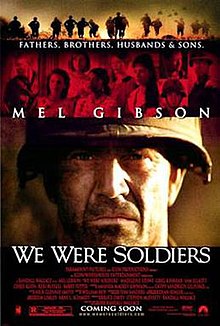We Were Soldiers
| We Were Soldiers | |
|---|---|
 We Were Soldiers movie poster | |
| Directed by | Randall Wallace |
| Written by | Harold G. Moore Joseph L. Galloway (book) Randall Wallace (screenplay) |
| Produced by | Arne L. Schmidt Jim Lemley Randall Wallace |
| Starring | Mel Gibson Madeleine Stowe Greg Kinnear Don Duong Sam Elliott Chris Klein Keri Russell Barry Pepper Dylan Walsh |
| Distributed by | Paramount Pictures (USA) Icon Entertainment (International) |
Release date | 2002-03-01 (USA) |
Running time | 138 min. |
| Country | USA |
| Language | English |
| Budget | $75,000,000 (estimated) |
We Were Soldiers is a 2002 war film that dramatized the Battle of Ia Drang in November 1965, the first major engagement of American troops in the Vietnam War. The film was directed by Randall Wallace and stars Mel Gibson. It is based on the book We Were Soldiers Once ... And Young by Lieutenant General (Ret.) Hal Moore and reporter Joseph L. Galloway, both of whom were at the battle.
Although the book is a non-fiction work, the film takes extensive dramatic licence in the portrayal of the battle's conclusion. While the book has a wider focus on other units and battles, the film only focuses on the actions of Moore's 1st Battalion, 7th Cavalry.
Plot Summary
Commanding the air cavalry unit, Lieutenant Colonel Hal Moore (Mel Gibson) is a born leader committed to his troops who are getting ready for the first battle of the Vietnam War. The story line is how he leads his men into the Ia Drang Valley in Vietnam.
The story also talks about the minor plot back at home where Moore's wife (Madeleine Stowe) along with another wife take over the job of delivering telegrams informing relatives of soldiers deaths to relatives that live at Fort Benning, the units base of operation. Before leaving for service in Vietnam, Moore delivers a touching speech to his unit.
"I can't promise you that I will bring you all home alive, but this I swear : I will be the first one to set foot on the field, and I will be the last to step off. And I will leave no one behind. Dead, or alive, we all come home together. So help me God."
The night before their departure for Vietnam a sort of a party for the officers assigned to the mission is celebrated. In this passage LTC Moore learns from a superior officer that his unit will be known as the 1st Battalion / 7th cavalry regiment, he is disquieted because the 1st Battalion / 7th Cavalry regiment was the battalion commanded by General Custer when he and his unit was slaughtered at the Battle of the Little Bighorn, and because Lyndon B. Johnson decreed that the war would be fought "on the cheap" without declaring it a national emergency, hence depriving Moore of his oldest, best-trained soldiers (a formal declaration of war would have meant mobilization and extension of the terms of enlistment for volunteer soldiers) -about 25% of his battalion- just prior to shipping for Vietnam.
The story then goes to the battle and switches between the Vietnamese and American forces view. In the movie, the Vietnamese troops were treated with respect (see below in Debates). At the end of the three days of fighting, the seemingly victorious G.I.'s leave. The movie puts a strong emphasis that Moore is the last one to set foot off the field of battle, once he's been assured that all his men dead or alive have been recovered from the battlefield.
Cast
- Mel Gibson - Lt. Col. Hal Moore
- Madeleine Stowe - Julie Moore
- Greg Kinnear - Maj. Bruce 'Snake' Crandall
- Sam Elliott - Sgt. Maj. Basil L. Plumley
- Chris Klein - 2nd Lt. Jack Geoghegan
- Keri Russell - Barbara Geoghegan
- Barry Pepper - Joseph L. Galloway
- Don Duong - Lt. Col. Nguyen Huu An
- Ryan Hurst - Sgt. Ernie Savage
- Robert Bagnell - 1st Lt. Charlie Hastings
- Marc Blucas - 2nd Lt. Henry Herrick
- Josh Daugherty - Sp4 Robert Ouellette
- Jsu Garcia - Capt. Tony Nadal
- Jon Hamm - Capt. Matt Dillon
- Clark Gregg - Capt. Tom Metsker
- Dylan Walsh - Capt. Robert Edwards
- Mark McCracken - Capt. Ed "Too Tall" Freeman
- Devon Werkheiser - Steve Moore
Trivia
- The mournful song heard during some of the aftermath and battle sequences is called Sgt. MacKenzie. An account of a Scottish soldier who fought in similar carnage, it was written by his descendant, Joseph Kilna MacKenzie. It was chosen for the film by Mel Gibson and Randall Wallace due to its haunting, desolate sound; of men prepared to stand their ground for family and friends.
- The Irish dance tune Garryowen is mentioned several times in the movie. It was a popular tune in the 7th Cavalry Regiment during the 1800s, and became a catch phrase in the 1st Battalion, 7th Calvary in modern times.
